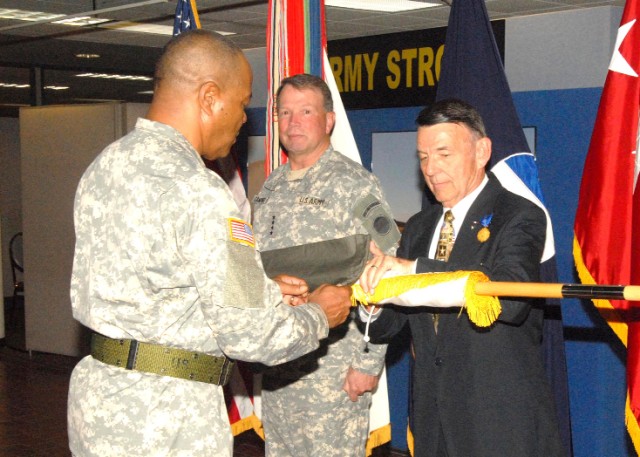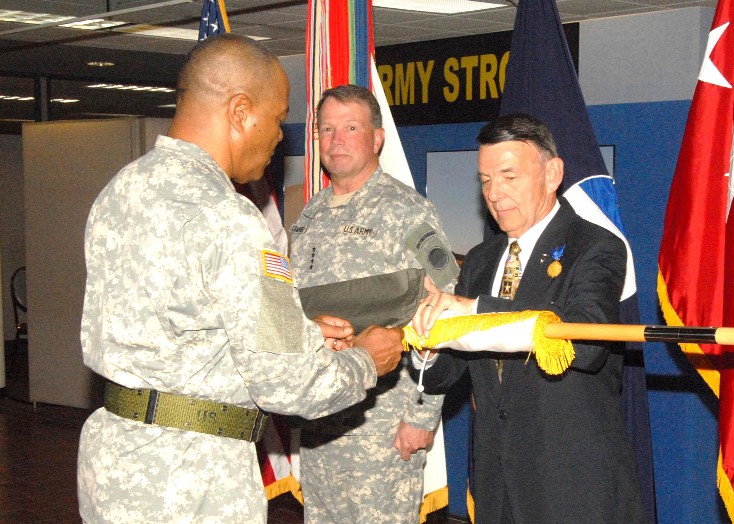
U.S. Army Forces Command (FORSCOM) G-4 sergeant major, assists Steve Koons (right) in casing the Senior Executive Service flag, symbolizing the end of Koons' service to the nation. Gen. Charles Campbell (middle), FOR... VIEW ORIGINAL
FORT MCPHERSON, Ga. -- To Steve Koons, nothing is more professionally fulfilling than ensuring Army units are fully equipped for their wartime missions. Koons, a native of Martinsville, Ind., is retiring after 30 years as an Army officer and nine years as a member of the Senior Executive Service, the highest ranks in the U.S. government. Koons is the assistant deputy chief of staff for logistics, G-4, at U.S. Army Forces Command (FORSCOM). "Our job is to provide credible logistic support to our units so they will have what they need when they go to war," Koons said recently. During his tenure, Koons has overseen the equipping of thousands of units assigned to FORSCOM as those units prepared for combat duty in Iraq and Afghanistan. "We\'re at war. You can't wait. You can't say 'submit a requisition.' You have to be proactive, find out what the requirement is and fill it. What we're doing right now does not fit the old Army regulations." Alluding to his military tour in Vietnam, he added, "It's a whole different ball game." During the past nine years, seven of which the Army has been at war, Koons has provided the executive level continuity necessary to get the job done while generals have rotated through the headquarters. Civilians bring to the war effort "stability and technical knowledge. That's the piece that I've been able to add to this," Koons said. "The units don't slow down, whether we change the G-4 or the commanding general or anyone else. Theater requirements still have to be met. That continuity allows the new boss to carry on. It [the logistic effort] is so intricate that we need the continuity the civilian workforce brings. That's the biggest piece," said Koons. For Koons and the 200 Civilians and Soldiers of his logistics staff, the job is never easy. For instance, the changing enemy has forced changes in Army equipment. "There was no requirement for add-on armor on older Humvees except for military police companies. Then we got into the improvised explosive devices (IEDs)," he said. "We started with fragmentation kits and kept adding on and adding on. The more we armored, the bigger the enemy made their IEDs. Then we had to put together training sets here because the armored Humvees were in theater. "Eventually we got the MRAP (Mine Resistant Ambush Protected vehicle), which led to whole new set of challenges for motor pools, parts, training and maintenance. Since the MRAPs are in theater and we couldn't get them here, we developed MRAP trainers from a series of trucks. They look like and act like MRAPs, so we're giving Soldiers something to train on," said Koons. For nearly 40 years, Koons has put in a lot of long hours and that takes its toll. "My family keeps me going. They've been very supportive. My daughter was in 10 schools in 12 years while I was in the military. All told, from the time I was enlisted to the time I retired as an officer, we moved 25 times in 30 years," he said. "That's why it was so great to get this job, to be able to actually settle down." His tenure at FORSCOM is the longest he's been anywhere in his career. In spite of his workload, he keeps a sense of humor and is popular on the headquarters staff. "A little humor helps get your point across," he said. "You have to keep the situation light, especially when you're in some pretty heavy stuff. That keeps it going." Among his favorite sayings, he said with a grin, is "Graveyards and funeral homes are full of indispensable people." Koons will miss "the people" most after he retires, he said. "Being able to produce credible logistics is because of the team effort. Whether it's the folks in logistics, resource management or operations, we make it work," he said. "But now it's time to step aside and let somebody else do it. I remember thinking as a lieutenant, 'When is that old guy [going to] leave'' Well, if my replacement doesn't miss a beat, then I've done my job right. I've put a lot of pressure on the people in G-4 here ... they know how to do their jobs. I'm their best coach and their worst critic. They can carry on," he said. Headquarters FORSCOM will carry on without Koons, but it won't be the same, according to his co-workers.

Social Sharing